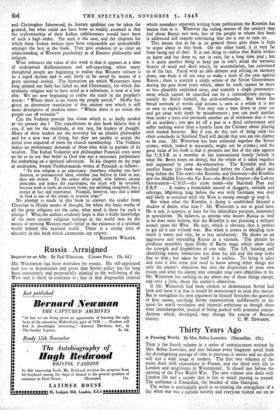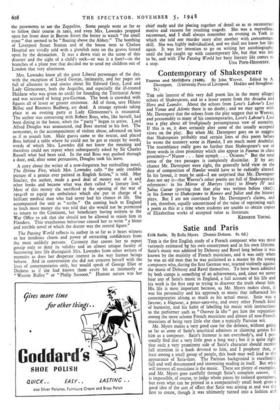Thirty Years Ago
A Passing World. By Mrs. Belloc Lowndes. (Macmillan 15s.)
This is the fourth volume in a series of reminiscences written by Mrs. Belloc Lowndes, and just because every fragment saved from the disintegrating passage of time is precious, it merits and no doubt will wan a wide range of readers. The first two volumes of the series dealt with experiences in France, and the third with life in London and neighbours in Westminster. It closed= just before the opening of the First World War. The new volume also deals with London life and a society that is not so much passing as passed. The ambience is Edwardian, the bracket of time Georgian. ' The writer is particularly good at re-creating the atmosphere of a day when war was a curious novelty and everyone rushed out on to the pavements to see ,the Zeppelins. Some people went so far as to follow their course in taxis, and even Mrs. Lowndes propped open her front door in Barton Street the better to watch " the small trout " that seemed to be " floating above the Abbey." The bombing of Liverpool Street Station and of the house next to Chelsea Hospital are vividly told with a ghoulish note on the graves forced open by the detonation. It was a dawn visit to the scene of this disaster and the sight of a child's sock--or was it a foot?—in the branches of a plane tree that decided me to send my children out of London that very afternoon.
Mrs. Lowndes knew all the great Liberal personages of the day, with the exception of Lloyd George, intimately, and her pages are full of allusions' to and stories about Sir Edward Grey, Lord and Lady Glenconner, both the Asquiths, and especially the ill-treated Haldane who was given no credit for founding the Territorial Army and was accused of being pro-German. The book is crowded with figures all of lesser or greater eminence. All of them, save Hilaire Belloc and Baroness Budberg, are dead. A strange episode taking place at an evening party at Lady Glenconner's is recounted. The author was conversing with Rdbert Ross, who, like herself, had been dining in the house, when the " party " began to arrive. Lord Alfred Douglas was announced, and Ross started to his feet. The newcomer, to the accompaniment of violent abuse, advanced on him as if to assault him. Male guests came to the rescue, and placed Ross behind a table where he could not be got at except by words, words of which Mrs. Lowndes did not know the meaning and therefore could not repeat when subsequently asked by Sir Charles Russell what had been said. In the end Ross was pushed through a door, and, after some persuasion, Douglas took his leave.
A story about the writer of a now-forgotten but enthralling novel, The Divine Fire, which Mrs. Lowndes calls " the only credible picture of a genius ever painted in English fiction," is told. May Sinclair, the author, made a good deal of money out of it and other books and became what was then called " a literary lion." Most of this money she sacrificed at the opening of the war of 1914-18 to equip an ambulance which she put in charge of a brilliant medical man who had never had his chance in life. She accompanied the unit as " scribe." On coming back to England to fetch more money she was told that she would not be permitted to return to the Continent, her beneficiary having written to the War Office to ask that she should not be allowed to rejoin him in Flanders. This treacherous behaviour caused her to write "a bitter and terrible novel of which the doctor was the central figure."
The Passing World reflects its author in so far as it bears witness to her insidious charm and power of extracting confidences from the most unlikely persons. Curiosity that causes her to repeat gossip only to deny its validity and an almost unique faculty of burrowing into life distinguish Mrs. Lowndes from other writers of memoirs as does her desperate interest in the way human beings behave. And in conversation she did not concern herself with the lives of contemporaries only, but would speak of George Eliot or Dickens as if she had known them every bit as intimately as " Weenie Ridley " or "Philip Sassoon." Human nature was her
chief study and the piecing together of detail so AS to reconstruct motive and reasons for resulting tragedy. She was a marvellous raconteuse, and I shall always remember an evening in York in which she told one murder story after another with consummate skill. She was highly individualised, and we shall not know her like again. It was her intention to go on writing her autobiography until she had caught up with contemporary life, but that was not to be, and with The Passing World her busy literary life comes to











































 Previous page
Previous page